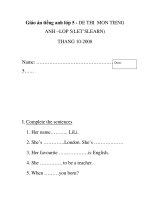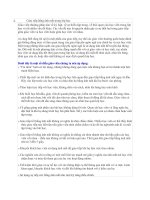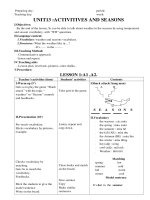giao tiep tieng anh hay va de hoc
Bạn đang xem bản rút gọn của tài liệu. Xem và tải ngay bản đầy đủ của tài liệu tại đây (426.19 KB, 42 trang )
www.englishlanguagetools.com
www.englishtalkstation.blogspot.com
First publication 2004
Fifth edition 2008
Before you begin
Several different kinds of activites - conversations,
pair work and role play - focus on speaking skills in
this conversations course.
Conversations
These exercises can be used for both listening and
speaking practice. They require you to work with a
partner. Because the conversation exercises model
conversational expressions and pronunciation and
present relevant functions, accurate repetition of the
conversations on the audio is important. However,
you are not required to memorise them.
Please use the “Look up and say” technique while
practising the conversations. For this technique, you
look at the page and them look up and say your line
while maitaining eye contact with your partner.
Pair work
The program makes extensive use of pair work
activities. As the title itself suggests, you need to
work with a partner for this kind of activity. It is good
to practice pair work activities with different partners
at different times so as to bring in variety and also to
maximise the amount of speaking practice you get.
Role play
These exercises are important for developing
fluency and are also fun. In this type of activity, you
need to assume the role of someone else.
Content
Unit 1: Meeting people
1. Introducing yourself 6
2. Meeting someone you know 7
3. Saying hello and goodbye 8
Unit 2: Talking about jobs and routines
1. A student’s routine 9
2. Busy days 10
3. On a day off 11
4. What do you do? 12
5. What about the family 13
Unit 3: Making requests and complaints
1. Making requests (1) 14
2. Making requests (2) 15
3. Complaints and apologies 16
Unit 4: Expressing likes and dislikes
1. Likes and dislikes 17
2. Ways of expressing likes and dislikes 18
3. Do you like ? 19
4. Others’ actions, your reactions 19
Unit 5: Talking about home and neighbourhood
1. Talking about home and family (1) 20
2. Talking about home and family (2) 21
3. Talking about neighbourhood (1) 22
4. Talking about neighbourhood (2) 23
Unit 6: Talking about locations
1. Telling where things are 24
2. Places and their locations 25
3. Asking for locations 26
Unit 7: Giving directions
1. Practice with giving directions 27
2. Giving directions to places 28
Unit 8: Giving instructions
1. Recipe instructions 29
2. Learning to cook 30
3. Simple instructions 31
Unit 9: Giving suggestions
1. Ways of giving suggestions 32
2. Visiting a place 33
3. Advice to a foreigner 33
Unit 10: Expressing abilities
1. Good at, bad at 34
2. About yourself 35
Unit 11: Relating past events
1. Where were you born? 36
2. Have you ever ? 37
3. How was your weekend? 38
4. Talking about a trip 39
Unit 12: Talking about the future
1. Learn some rules 40
2. What are you doing ? 41
Script: Unit 2 Exercise 1
42
A: Excuse me. I don’t think we have met before.
My name is Mary Jenson.
B: Oh, hello. I’m Bikash Chettri
A: Good to meet you Mr Chettri.
B: Pleased to meet you too, Ms Jenson.
Now in the same way introduce yourself to
your partner or to someone else.
Useful expressions
Hello, I’m Hi, my name is Nice/Good/Pleased to meet you.
C
Pair work
Meeting people
Introducing yourself
1
1
A: Hello. I’m Jason.
B: Hi. My name is Dolma.
A: Nice to meet you, Dolma.
B: Good to meet you too.
A
Listen to people introduce themselves. Listen at least
three times.
Now practice the same conversations with a
partner. Practice for three to five minutes.
B
Role play
A: Hello. Can I sit here?
B: Yes.
A: By the way, I’m Robin.
B: Hi. My name is Jessica.
A: Nice to meet you.
B: Pleased to meet you too. And where are you from,
Robin?
A: I’m from Kathmandu. What about you?
B: I’m from New York. Oh, this is my stop. Bye, Robin.
A: Bye. See you.
6
A: Hi. How have you been?
B: Fine, thanks. And you?
A: Pretty good. How’s the family?
B: Just fine. And how’s work?
A: Good. Very busy.
B: Yeah, me too.
A: Well, talk to you later.
B: Yeah. Nice talking to you. Bye.
A: Bye.
Meeting someone you know
2
A: Hi. Subodh. How are you today?
B: Not bad, thanks. How about you?
A: Great, thanks.
B: So, where are you heading?
A: To college, as usual. I’m already late. See you
later, Subodh.
B: Take care. Bye bye.
A
Listen to friends talking when they meet.Listen at least
twice.
Now take turns talking.This time use your own
information.
C
Pair work
Now practice the same conversations with a
partner. Practice for three to five minutes.
B
Role play
Some useful expressions
How are you?
How have you been?
How are you doing?
How are things?
How’s family?
How’s work?
How’s business?
How are studies?
Just fine, thanks.
Great, thanks.
Pretty good, thanks.
So so. Thanks.
Well, talk to you later.
Well, nice talking to you.
See you.
See you later.
7
1. Hello. How are you? You too. Fine, thanks.
2. Have a nice day. You too. I’m OK. How
Bye-bye. are you?
3. Good evening. Hello. Good night.
4. See you later. Not bad thanks. Bye-bye.
A: Hi, Tony. How are you?
B: Great! How about you, Susan?
A: See you later, Tony.
B: Bye-bye, Susan.
A: Good morning, Sir. How are you?
B: I’m just fine, Tina.Thank you.
A: Good afternoon,Mr. Thapa.
How are you?
B: Not bad, thanks.
And how are you, Ms Taylor?
A: Good-bye. Have a nice day.
B: Bye-bye. See you tomorrow.
A: Bye. Have a nice evening.
B: Thanks. You too.
A
Listen to people saying hello and goodbye. Listen twice.
Practice saying hello and goodbye with your
partner.
B
Pair work
Tick the correct responses. Then practice
saying.
C
Pair work
Saying hello and goodbye
3
8
Talking about jobs and
routines
A student’s routine
1
2
A
Listen to a student talk about his routines.
B
Listen again. Which of these words do you hear? Tick
them as you listen.
always
usually
often
sometimes
seldom
hardly ever
never
C
Listen again and tick these words and phrases as
you hear them.
get up
study
get dressed
go out
go to bed
have breakfast
watch TV
visit
in the morning
for sometime
on time
in the afternoon
in the evening
weekends
late
on holidays
D
Listen once again. The student is talking about what he
does on college days, at weekends and on long holidays.
E
Now tell from memory what the student does. You may
say something like this:
On college days, the student gets up early in the
At weekends, he gets up
On long holidays, he
9
My busiest day is
Sunday. All our relatives
come to our house for
lunch and dinner almost
every Sunday.
A
Listen to people talking about their busiest days. Listen
three times.
Busy days
2
Take turns. Talk about your busiest day of the
week. Ask these questions and others of your own.
What’s your busiest day?
What do you usually do?
What time do you usually get up?
What time do you start work?
What do you do all day?
Where do you usually have your breakfast and lunch?
What do you usually do after work?
What time do you usually get home?
What time do you go to bed?
B
Pair work
I hate Mondays. I
get up before 5
o’clock. I catch the
bus at six. I start
work at seven and
finish around four in
the afternoon. Then
I have a two-hour
computer class.
After that I a private
tuition class to some
children in the
neighbourhood. It’s
usually 9 o’clock
when I arrive home.
Saturday is my busiest
day. I always clean the
house in the morning. I
usually do the
shopping in the
afternoon. In the
evening, I work as a
teacher in an adult
education class. The
class finishes at 10.
1
2
3
10
A
Listen to a conversation.
On a day off
3
Woman: What do you usually do on your day off, Steve?
Man: Oh, I always get up very early, around 5 o’clock.
And I run for an hour.
Woman: Wow. That sounds instresting. What do you do next?
Man: Then I usually go to the gym and lift weights for
about an hour and swim for half an hour.
Woman: My goodness! You really are a fitness freak.
Man: I guess so. After all that exercise, I come home
and have a big breakfast. What about you,
Susan?
Woman: Well, on my day off, I just watch TV all day.
Man: Now you are a real couch potato.
always
usually
often
sometimes
seldom
hardly ever
never
100%
0%
Adverbs of
frequency
Now take turns telling what you do on your day
off. Don’t forget to use some of the words and phrases given
in the boxes below.
C
Pair work
First
Next
And
Then
And then
After that
Finally
Sequence
markers
Now practice the same conversation with a
partner. Practice for three to five minutes.
B
Role play
11
Woman: What do you do, Laxman?
Man: I work with a travel agency.
Woman: Sounds good. What do you do, exactly?
Man: I’m a tourist guide. I take people on tours to
different parts of the country.
Woman: So, you get to travel a lot, don’t you?
Man: Yes. Sometimes I even go out of the country to
places like Tibet and Sikkim.
Woman: Wow. You really have a great job.
Man: Yes, I love my job. What about you, Rosy?
What do you do?
Woman: I work in a hospital.
Man: Really? Are you a nurse?
Woman: No, I’m a brain surgeon. I perform more than a
dozen operations every week. I have to work
long hours and I hardly get any holidays.
Man: So, how do you like your job?
Woman: Not bad. But I can’t give much time to my
family.
Ask about your partner
Do you have a job?
Where do you work?
What do you do exactly?
What time do you start work?
What time do you finish work?
Do you have lunch at work?
Do you take a break in the
afternoon?
How do you like your job?
What do you do after work?
Do you watch television?read?
Ask about your partner’s
friend or relative
Tell me about your friend/brother/
sister/father/mother
Where does he/she work?
What does he/she do exactly?
What time does he/she start work?
What time does he/she finish
work?
Does he/she like his job?
What does he/she do after work?
A
Listen to a conversation. Listen at least three times.
Then practice the conversation with a partner.
What do you do?
4
Now take turns talking about your own job or your
friend or relative’s job.Take help of the questions given below.
B
Pair work
12
Practice the same conversation with a partner.
Practice for three to five minutes.
B
Role play
Man: What do you, Sarita?
Woman: I’m a teacher.
Man: Really? Tell me about your family.
Woman: Well, I’m married and have three children.
Man: What does your husband do?
Woman: He has a small business.
Man: Oh, that’s interesting. What business does he have?
Woman: He has a small garment factory. He exports all
the products.
Man: What about your children? Do they all go to school.
Woman: No, only two of them go to school. The
youngest one is just five months old.
Man: You have a small and beautiful family.
Woman: Yes, it’s a lovely family. And what about you?
Are you married?
Man: No, I’m not. I’m still studying. I’m in my final
year of MBA.
Woman: Oh, great. By the way, do you have any brothers
and sisters?
Man: Yes, I do. I have a brother and a sister.
Woman: And what do they do?
Man: Well, my brother drives a taxi and my sister flies
a plane.
Woman:
No kidding!
A
Listen to a conversation. Listen at least three times.
What about the family?
5
Now have a similar conversation with your
partner using your own information
C
Pair work
13
Making requests and
complaints
Making requests(1)
1
3
A
Listen to some requests and their responses.
A:
Would you mind turning down the TV, Roshan? I’m trying to
study.
B: Sure. I’ll turn it down.
A:
Max, could you move your car, please? It’s blocking my way.
B: Oh, OK. I’ll park it across the street.
A:
Would you mind not making so much noise?
B: Sorry. I didn’t know I was disturbing you.
A:
Please close the door on your way out.
B: All right. I’ll do it.
A:
Would you mind heping me to carry this table?
B: Not at all.
A:
Excuse me. Could you move your legs, please?
B: Sorry. I didn’t know it was bothering you.
A:
Can you help me in the kitchen?
B: Sure. No problem.
A:
Can you lend me your camera for a day?
B: Oh, I’m really sorry. I’m using it.
A:
Can I borrow your pen?
B: Sure. Here you are.
Now make the same requests but give your
own responses.
C
Pair work
Now practice. Make the same requests and
give the same responses.
B
Role play
14
Lend me Rs 50, please.
Please lend me Rs 50.
Can you lend me Rs 50?/Can I borrow Rs 50?
Can you lend me Rs 50, please?/Can I borrow Rs 50, please?
Could you please lend me Rs 50?
Would you mind lending me Rs 50, please?
A
Listen and learn how to make requests in several ways.
Making requests(2)
2
All right.
OK. I’ll do that.
OK. Here you are.
Sure! No problem!
Oh, sure. I’d be glad to.
B
Listen and learn several ways of accepting a request.
Sorry. I don’t have any money. (Say sorry and give a reason)
I’m sorry but I’m busy right now. (Say sorry and give a reason)
I’d rather not.
What! You must be kidding!
C
Listen and learn several ways of refusing a request.
Now use the cues given below to make
requests to each other. You may either accept or
refuse the requests.
D
Pair work
open the door move saide
come in go out
get me a glass of water post this letter for me
sing a song help me do my homework
scratch my back wash my shirt
polish my shoes give me a massage
Now think of and make your own requests.
Your partner either accepts or refuses them.
E
Pair work
Example: Would you mind opening the door, please?
15
Complaints and apologies
3
A
Here are some of the ways people generally make
apologies. Listen and learn.
Simply apologise:
I’m sorry I’m late.
Apologise and explain:
I’m sorry. I missed the bus.
Apologise and say you made a mistake:
I’m sorry. I woke up late today.
Apologise and make a promise:
I’m very sorry. It won’t happen again.
B
Listen to people making complaints and apologies.
Pause the audio and repeat what they say.
A: By the way, you haven’t returned my camera. It’s been really long.
B: I’m really sorry. I’ll give it to you tomorrow.
A: I’m really upset with you. You didn’t phone me yesterday.
B: I’m extremely sorry. I was really busy.
A: Don’t forget you still owe me Rs. 1000.
B: Oh, sorry. I haven’t been able to manage it.
A: I was waiting for you in the park but you didn’t turn up.
B: Oh, I got there late, and you had already gone. I’m really sorry.
A: You always leave the door open. Why don’t you ever close it?
B: I’m really sorry. From next time, I will.
A: You are smoking in a No Smoking area.
B: Oh, I didn’t notice the sign. I’ll go outside.
Think of five things to complain to your
partner. Then make your complaints. Your partner
apologises. Take it in turns.
C
Pair work
16
Expressing likes and
dislikes
Likes and dislikes
1
4
A
Listen to the conversations.
Boy: Do you like folk music, Tina?
Girl: No, I don’t like it very much, do you?
Boy: Yes, I love it. Kumar Basnet is my favourite singer.
What kind of music do you like?
Girl: Well, I like pop music a lot.
Boy: Really? Who’s your favourite singer?
Girl: Sugam Pokhrel. How about you? Do you like him?
Boy: He’s OK. But I’m fond of Nima Rumba.
Girl: Do you like playing cricket, Max?
Boy: Yes, I love it. What about you?
Girl: Well, I don’t like playing cricket but I love watching
it on TV.
Boy: That’s interesting. So, besides that, what do you like
doing in your free time?
Girl: Well, I’m fond of meeting new people. I also enjoy
gardening and cooking.
Boy:
Cooking? I can’t stand it.
Now take turns talking.This time use your own
information.
C
Pair work
Now practice the same conversations with a
partner. Practice for three to five minutes.
B
Role play
17
Ways of expressing likes and dislikes
2
A
Listen to people expressing their likes and dislikes
about different things.
I like Hindi films.
I like watching horror films.
I enjoy sports.
I enjoy playing football.
I’m fond of sweets.
I’m fond of eating icecream.
I love books.
I love reading novels.
I’m crazy about music.
I’m crazy about listening to pop music.
I don’t mind journeys.
I don’t mind travelling by bus.
I don’t like Thai food.
I don’t like eating in restaurants.
I hate films.
I hate sitting in the cinema hall for three hours.
I can’t stand Peter.
I can’t stand listening to his lies.
B
Now practice expressing your own likes and dislikes using
the words given in bold above.
18
Express your likes and dislikes on the
following topics. First, study the given example.
Pair work
Do you like ?
3
pop music
horror films
shopping
cooking
Rajesh Hamal
cricket
pet dogs
Chinese bikes
washing clothes
learning different languages
getting up early
walking in the rain
meeting new people
eating out
looking after children
donating money
Example:A:Do you like pop music?
B:No, I don’t like it very much. Do you?
A:Yes, I love it.
A:Do you like getting up early in the morning?
B:I don’t mind getting up early. What about you?
A:I hate getting up early.
Others’ actions, your reactions
4
A
Listen to some more expressions of likes and
dislikes. Each time pause the audio and repeat the sen-
tence.
I like people giving me gifts.
I don’t mind guests coming to my house.
I don’t like friends asking me money.
I hate dogs barking at me.
Now take turns talking about what you like or
dislike others doing. Talk about the following and more.
B
Pair work
friends teasing you
others correcting your mistakes
people laughing at you
people doing charitable work
strangers asking for directions
people praising your work
parents beating their children
neighbours helping you
19
Talking about home and
neighbourhood
5
A
Listen to two people talking.
A: Do you live in a flat?
B: No, I don’t. I live in a house.
A: What’s it like? Does it have a garden?
B: Yes, it does. And it has a beautiful view. It’s just next to
the river.
A: That sounds good. Do you live alone?
B: No, I don’t. I live with my parents and my sisters.
A: How many sisters do you have?
B: I have three sisters.
A: That’s a big family. Do you have a big house?
B: Yes, we do. It has twelve rooms.
A: Twelve rooms! How many bedrooms does it have?
B: It has five bedrooms.
A: Do you have your own bedroom?
B: Yes, I do. In fact, everyone has their own bedroom.
A: That’s very nice.
Now have a similar conversation using your
own information.
C
Pair work
Now practice the same conversation at least
three times.
B
Role play
Talking about home and family (1)
1
20
Talking about home and family (2)
2
Do you have any brothers and sisters?
Do you have a pet dog?
Do you have any money in your pocket?
Does your father have a bank account?
Does he have vehicle of his own?
Does your mother have a job?
Does she have expensive jewellery?
What do you have in your bag?
What things do you have in your bedroom?
What programs does your computers have?
How many brothers and sisters does your father/mother have?
Take turns asking and answering these
questions.
A
Pair work
Example:A:Do you have any brothers and sisters?
B:Yes, I do. I have two brothers and a sister.
A: What do you have in your bag?
B: I have some files in my bag.
Tell each other five things that you have and
five things that you don’t have at home.
B
Pair work
Example:I have a beautiful car.
I don’t have a computer.
Think of three things that your best friend or
neighbour has but you don’t have. Then tell your partner.
C
Pair work
Example:My neighbour has a big dog but I don’t.
21
Talking about neighbourhood (1)
3
A
Listen to people telling a few things about their
neighbourhood.
There’s a big market.
There’s no swimming pool.
There isn’t a hospital.
There are some restaurants.
There are no hotels.
There aren’t any clubs.
There’s a lot of traffic.
There’s not much pollution.
There’s plenty of sightseeing.
There are a lot of shops.
There aren’t many houses.
There are plenty of clinics.
C
Now practice saying similar sentences about your own
neighbourhood.
B
Listen again and repeat each sentence.
A: Whereabouts in Kathmandu do you live, Shyam?
B: I live in Chabahil.
A: Really? What’s the neighbourhood like?
B: It’s good. It has many facilities but there’s a lot of traffic.
A: Is there a market?
B: Yes, there’s a pretty big market. There are also a few
department stores.
A: Sounds good. Are there any restaurants and hotels?
B: There are some restaurants but they’re not very good.
And there aren’t any hotels.
A: What about sports and entertainment?
B: Well, there are a couple of gyms and there’s a big cinema
hall. But there’s no swimming pool. I have to go all the
way to Balaju every Saturday.
Talking about neighbourhood (2)
4
A
Listen to a conversation.
Now have a similar conversation about your
own neighbourhood.
C
Pair work
Now practice the same conversation at least
twice.
B
Role play
There’s a
There’s no
There isn’t a
There are some
There are no
There aren’t any
There’s a lot of
There’s not much
There’s plenty of
There are a lot of
There aren’t many
There are plenty of
Useful expressions
23
Talking about locations
6
B
Listen and practice this conversation.
A: Where’s my tie?
B: I think it’s in the wardrobe.
A: No, it’s not in there.
B: Oh, it must be on the table.
A: Let me see. No, it’s not there either. Ah, yes, it’s under the
table.
Telling where things are
1
in front of
behind
undernext to
on
in
A
Look at the pictures below and say a sentence about
each picture like in the example.
Example:The keys are in the briefcase.
Take turns telling where these things are in
your living room.
C
Pair work
TV dustbin calendar tea table flower vase
fan telephone books cassettes and CDs
Example:The calendar is on the wall.
24
Places and their locations
2
Park Street
Main Street
King Street
school park
book
store
library
coffee
shop
police
station
hospital
post
office
pharmacy
super
market
A
Look at the map and read the given sentences.
gym
petrol
pump
shoe
shop
pool
cinema
The coffee shop is on the corner of Main Street and Park
Street. It’s opposite the hospital.
The pharmacy is in Main Street. It’s next to the gym.
Cinema Street
P
i
n
e
S
t
r
e
e
t
Centre Street
Main Street
bank
super market
hospital
pharmacy
coffee
shop
shoe
shop
school
r
e
s
t
a
u
r
a
n
t
cinema
police
station
post office
gym
cyber cafe
library
Take turns asking and answering questions
about places in the map below. First look at the example.
B
Pair work
Example:A:Where’s the post office?
B:It’s in Centre Street opposite the school.
25









